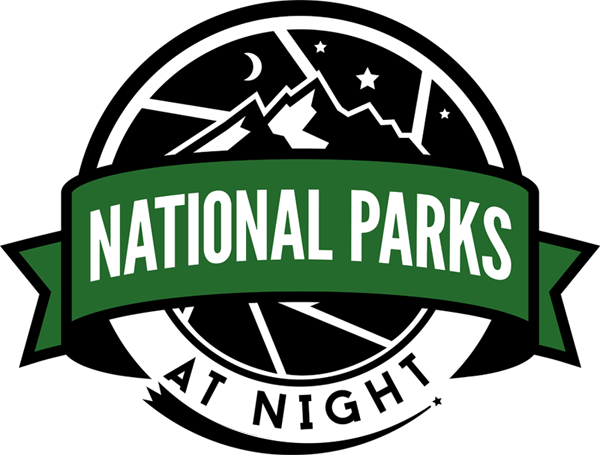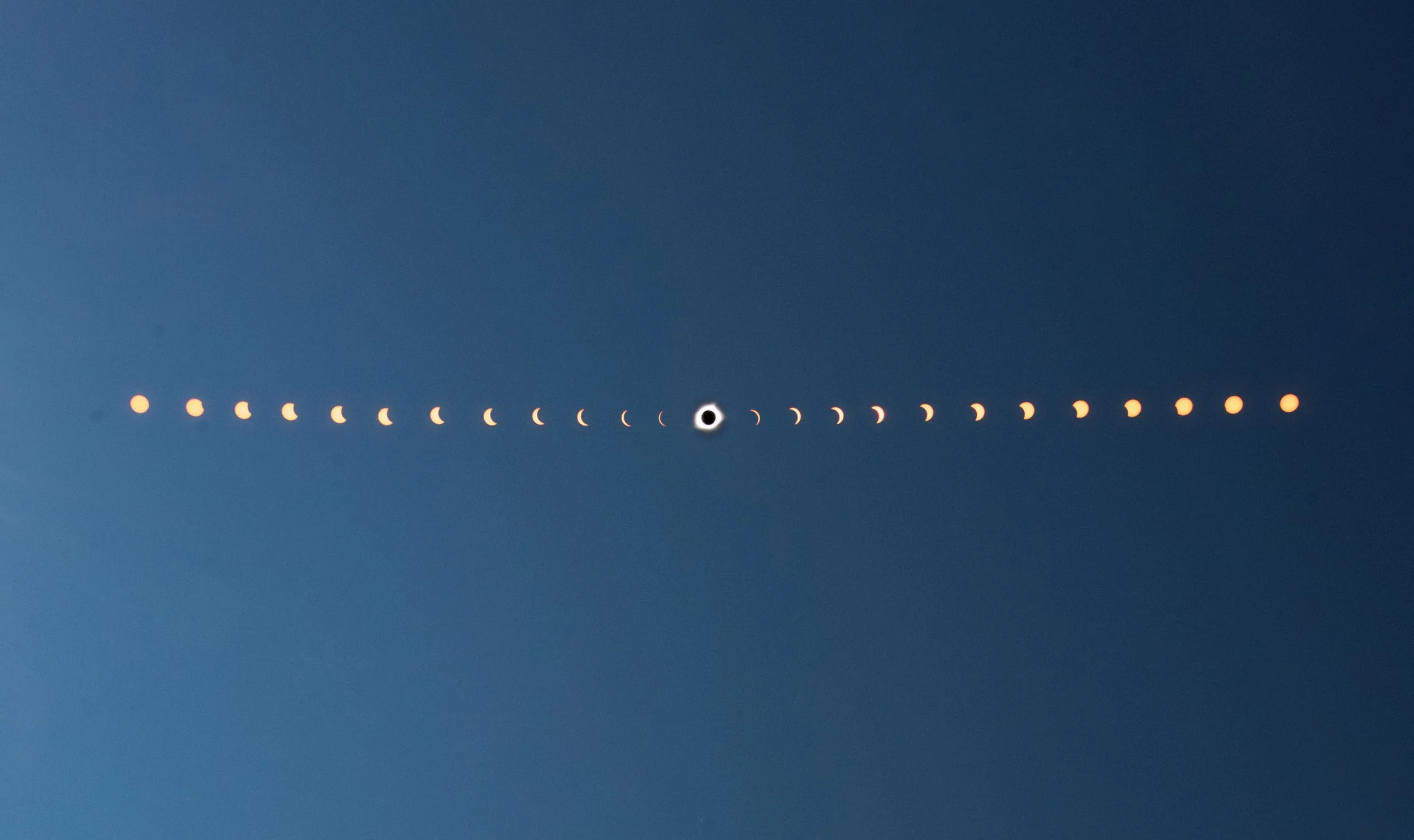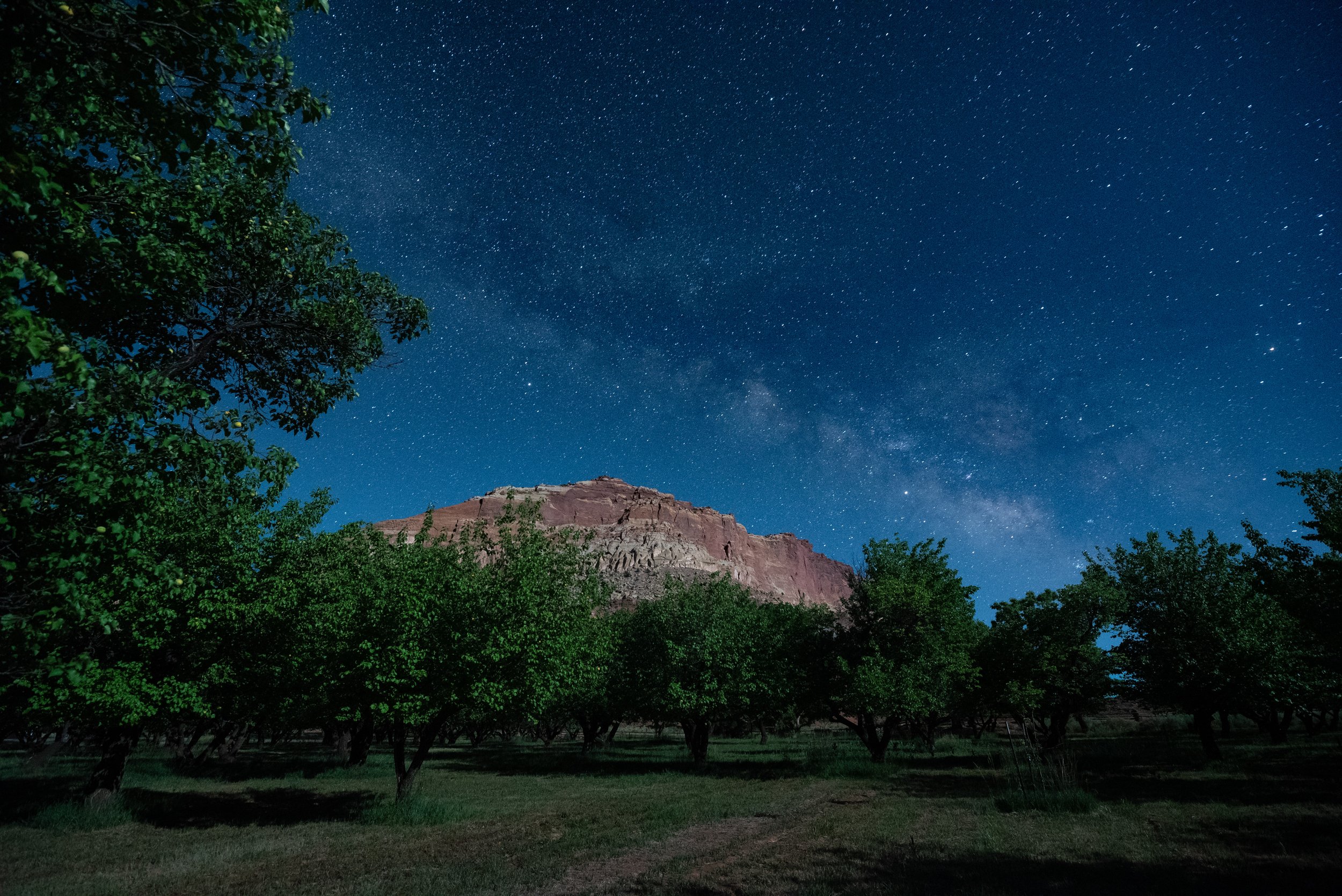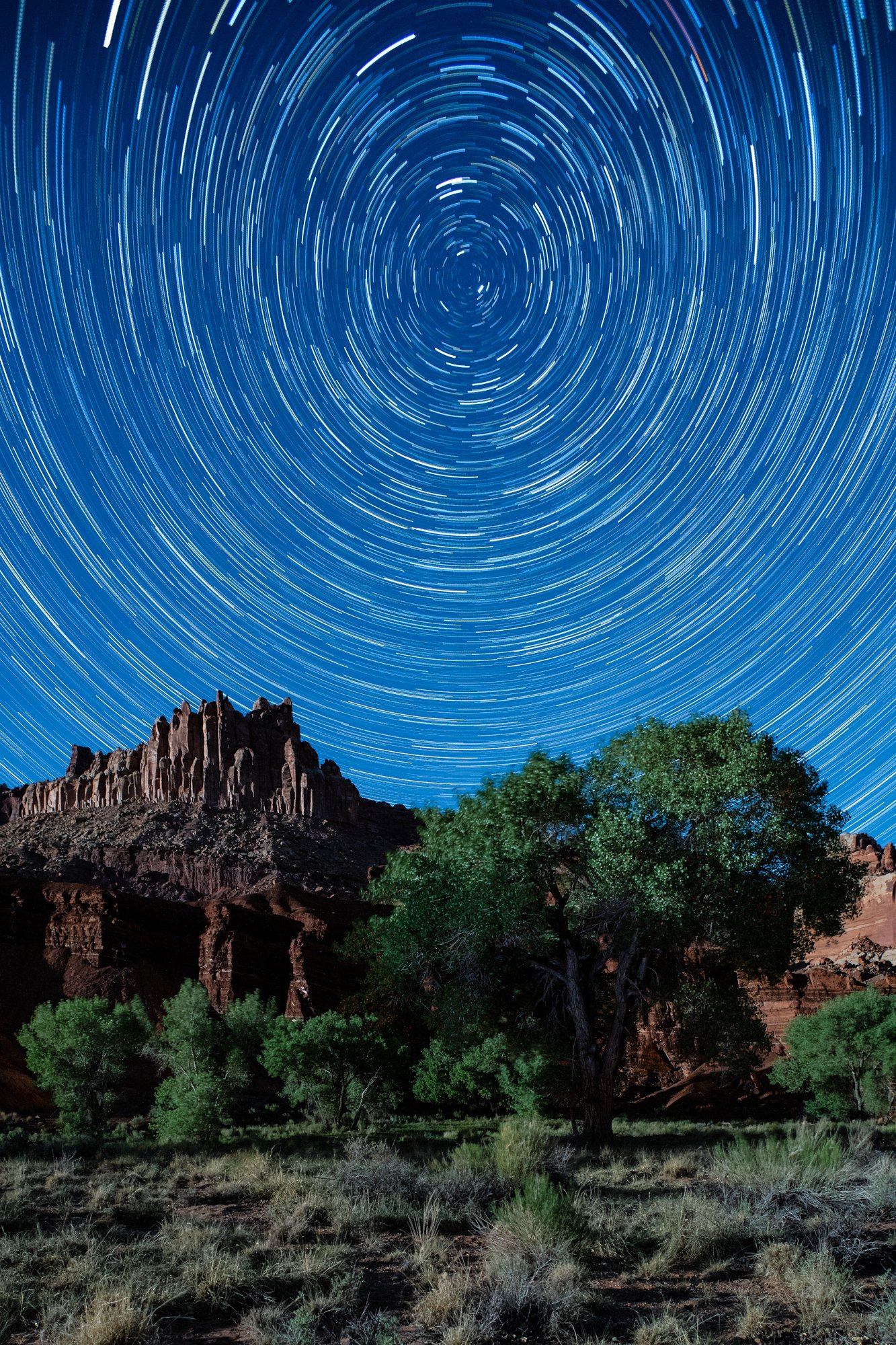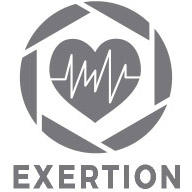Capitol Reef & the Solar Eclipse
Capitol Reef is the least-known of Utah’s “Mighty 5” national parks, yet is stunningly beautiful and aesthetically diverse. And it lies in the path of the 2023 annular solar eclipse! We’ll be there for an opportunity to photograph the eclipse, plus we'll have an entire night photography workshop during a new moon in this International Dark Sky Park.
Workshop Details
October 13-18, 2023 — Completed
This is a 5-night, 6-day workshop. Your adventure begins on the morning of Friday, October 13, and ends after a final slideshow on the afternoon of Wednesday, October 18.
$2,195 + applicable taxes. Register below.
Skill level
Intermediate and above. Participants should have a firm grasp of the basic principles of photography and of their cameras, and have a comfortable understanding of night photography fundamentals.
Group size
14, with 2 instructors — 7:1 ratio
NPS website
Workshop Leaders
Registration
This event has passed. Thanks for your interest!
| • Deposit of $600 is required to reserve your spot at the workshop. |
| • Balance of $1,595 is due on July 15, 2023. —> Pay balance here. |
| • You may choose the “Pay in Full” ticket if you desire to pay all at once. |
| • Last day for a cancellation request is July 14, 2023 (see cancellation and refund policy). |
| • The workshop fee does not include lodging, food, airfare, Capitol Reef entrance fees, or transportation to the lodging or to our nightly shoot locations. |
The Capitol Reef Experience
What better way to capture the annular eclipse than in a park that displays eons of geologic time? Join us to explore the waterpocket fold. Its cliff, canyons, domes and bridges will adorn not only our starry skies, but also the eclipse!
During this adventure, you’ll get hands-on instruction on how to plan for and shoot an annular solar eclipse. Both Gabe and Matt photographed the 2017 eclipse in totality, so you’re joining experienced instructors.
We’ll spend a day practicing photographing the sun and then make our eclipse images the next morning. Some people will track, some people will composite, some will do both! You might even bring a telescope. Then we will teach you how to post-process your eclipse images and composites.
The remainder of the trip will be our classic dark sky night photography workshop. We’ll work on blue hour blends, star points, star trails and noise stacking.
Capitol Reef is a fantastic place to focus on natural light, as artificial lighting is not allowed for photography at night. So we’ll embrace this and teach all the techniques for making successful images under these dark, gorgeous conditions.
Diverse biomes and geological regions will give us ample opportunity for visual variation. We can visit the lush orchards of Fruita (possibly featuring fall colors at that time!); the expansive rolling, twisting landscapes and vistas; and slot canyons. domes, and a natural bridge or two.
The park is well-known for exposing over 10,000 feet of sedimentary strata. Rock hounds and geology buffs will have a field day. We’ll be working along the most scenic route, aside the Fremont River, which contains the white domes of Navajo sandstone that give the park its “Capitol” name. The “Reef” portion of the name derives from the rocky cliffs that form a natural barrier, much like a coral reef does in the ocean.
The oldest rocks are found in the western part of the park, and the younger rocks are found near the eastern boundary. This layer upon layer sequence of sedimentary rock reveals nearly 200 million years of geologic history. Couple that with ageless stars and you have a magical combination for night photography.
And all of this is fairly close to our hotel nearby on Torrey, Utah.
What You Should Know
This workshop caters to knowledgeable photographers with an intermediate or higher skill set. Participants should have a firm grasp of the basic principles of photography and of their cameras, and have a comfortable understanding of night photography fundamentals.
If you would like to attend this workshop but are unsure whether you have adequate night photography skills, we can offer pre-workshop tutoring to get you ready for your adventure with us. Alternatively or additionally, a few of us have written books that may be productive pre-workshop reads.
What You Will Learn
We hope to push you to step outside your comfort zone—to test the limits of what you and your camera can do.
TOPICS COVERED WILL INCLUDE:
planning for and capturing an annular solar eclipse (the “ring of fire”)
using trackers to follow the sun
shooting a wider eclipse composite
camera settings for an eclipse
blue hour blends with dark skies
star points and noise stacking
star trails
and more …
This workshop will have both field and classroom instruction. We will be in the classroom during the day, and out in the field at different locations each night. Participants can stay out shooting as long as they, or their camera’s batteries, hold out. While in the field, the instructors will demonstrate their own techniques and will work with participants one-on-one to make sure everyone gets the most out of the workshop.
Our locations are vast, so everyone will be able to spread out and not get in one another’s way. Each participant will have the opportunity to work one-on-one with Matt and Gabe in the field. Capitol Reef is a massive park spanning 378 square miles. Much of it is breathtakingly beautiful backcountry. But the road-accessible portions (which we will focus on) have a variety of features including natural bridges, wide open valleys, cliffs, water pockets, gorges and more.
We do not tell our attendees what to photograph, and we won’t line you up in a row to all shoot the same thing (unless it’s helpful to get some people on track). Instead, we encourage you to use what you have learned to create your own unique images, and to let us guide you through the process should you desire.
We do not teach you to do what we do, but rather how to develop your own night vision.
Night Conditions
Logistics & General Info
Travel
You are responsible for arranging and paying for your own transportation.
Rental Car
You will need a rental car.
There is no need for four-wheel-drive.
If you are interested in carpooling or sharing a rental car, let us know and we will try to connect you with another attendee looking for the same.
You are responsible for arranging and paying for your own transportation.
Nearby Airports:
Salt Lake City (SLC) — 3 hours, 15 minutes from Torrey, Utah
Grand Junction (GJT) — 3 hours, 10 minutes
Las Vegas (LAS) — 5 hours, 25 minutes
Lodging & Food
We’re staying just outside the park’s western boundary.
Lodging
You are not required to stay at the official workshop lodging, though doing so does make it easier to meet with the group each morning. Also, it may be difficult to obtain rooms or camping elsewhere in Torrey for the eclipse due to its popularity. We have up to 14 rooms under contract.
Hotel info and group code will be sent after you register.
If you are interested in sharing a room, let us know and we will try to connect you with someone like-minded in the group.
Food
Torrey has more than 15 food options.
We encourage eating two meals per day—a good breakfast and a great late lunch.
When on the night shoots, you may wish to bring snack food or a sandwich and plenty of water.
Weather
Expect daytime highs in the 60s F, lows in the 40s.
Recommended Attire
Shorts and short-sleeve shirts for daytime, light pants and long-sleeve shirts for night.
A sweatshirt and medium-weight jacket will likely be useful, and a base layer might not be a waste of packing space. Layers are good.
Comfortable and protective shoes are recommended for getting around. There won’t be long hikes, but we will be on trails, so quality trails shoes or hiking boots would be optimal.
Exertion Level
The exertion level of this workshop is Easy. (See more about our classifications.)
No vigorous activity will be required during the workshop, but please consider your physical abilities prior to registering. There won’t be any long hikes, but there will be trails involved, and you should be comfortable carrying your own equipment over uneven ground in the dark.
Capitol Reef ranges between 6,000 and 9,000 feet in elevation. We will not be going to the high points, but altitude sickness can become a concern at over 8,000 feet, and some people can experience it at elevations as low as 6,000. If you are generally sensitive to high elevations, or if you are coming from a sea-level region, we advise arriving in the area a day or two early to acclimate by going on some short hikes at altitude. We also advise staying well hydrated.
Considerations
You may want to buy or rent a long lens or mountable telescope for this event to maximize your eclipse capture. After registration, Gabe and Matt will advise you on the best gear to match your goals.
Please read our FAQs section for more information about skill and gear requirements, and other information that pertains to all our workshops.
If you have questions, please contact us—we're happy to talk it over with you.
Two Rings of Fire …
“It’s hard to describe how remote it feels to be there. Alien. Nature in its most brutal and beautiful form.”
Capitol Reef makes my heart sing. Its middle section along Highway 24 is enough for most people to say, “Wow! That’s amazing,” but it’s just the start of the park. There are entire north and south sections that are under-visited and frankly stunning. You just need 4x4 and high clearance for some of it.
But back to the heart of Capitol Reef. The rippling and twisty geologic strata demonstrate the slow violence that plate tectonics can deliver over vast periods of time. I can stare at it for hours and hours. Especially at sunset and during twilight. Massive cliffs like Chimney Rock, Mummy Cliff and those seen along the entire drive are a trip through time itself.
Marry this (and all the other amazing land features) to the stunningly dark skies and you have a match made in the heavens.
It’s hard to describe how remote it feels to be there. Alien. Nature in its most brutal and beautiful form. A quintessence of only the hardiest materials, flora and fauna.
Add to this inky black skies, brilliant stars winking in the dusty air, and moonlight crafting and shaping the contours and angles of the landscape. It’s an amalgam for fascination, and an opportunity to show your appreciation by making your own photographic art blending all of these elements together.
